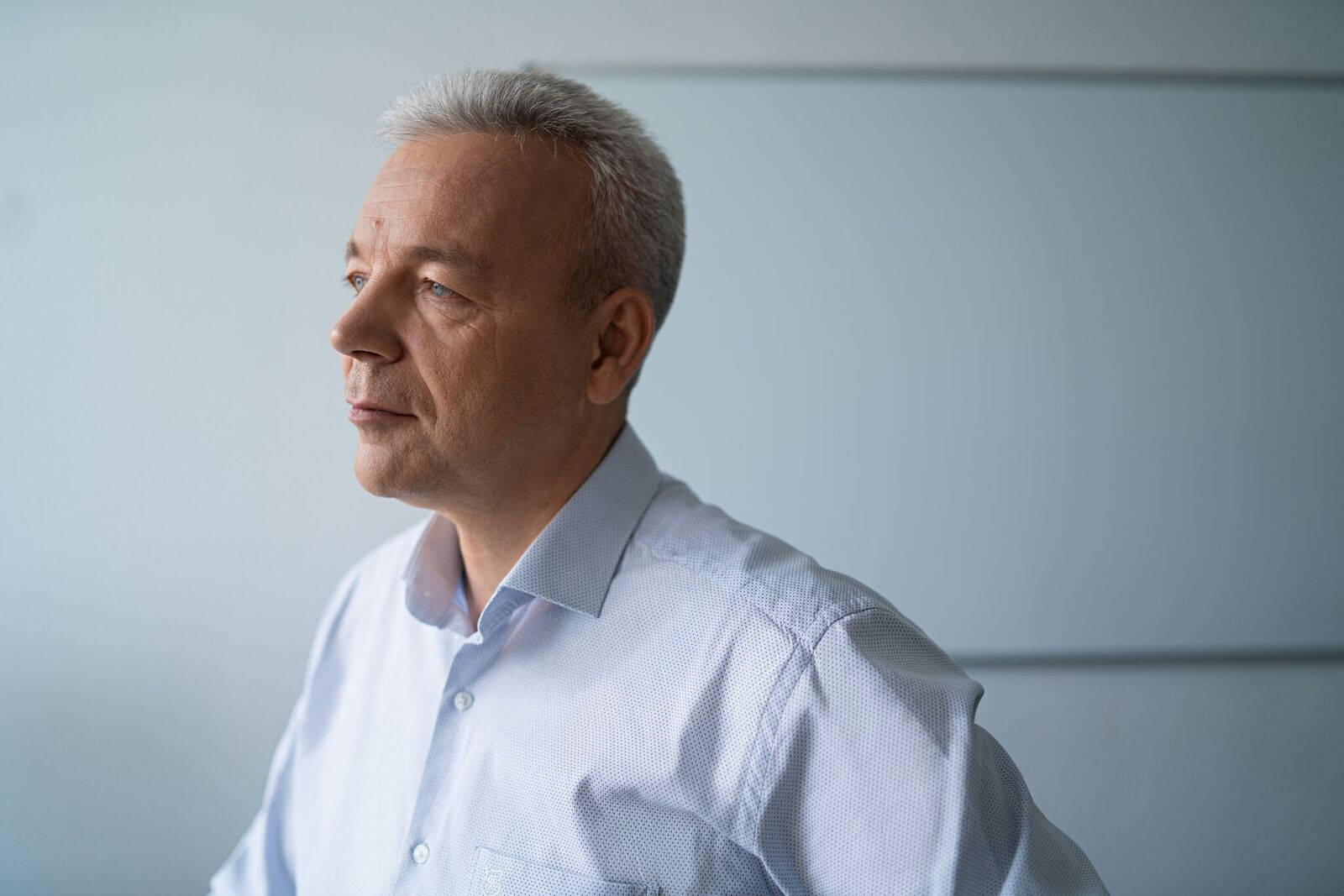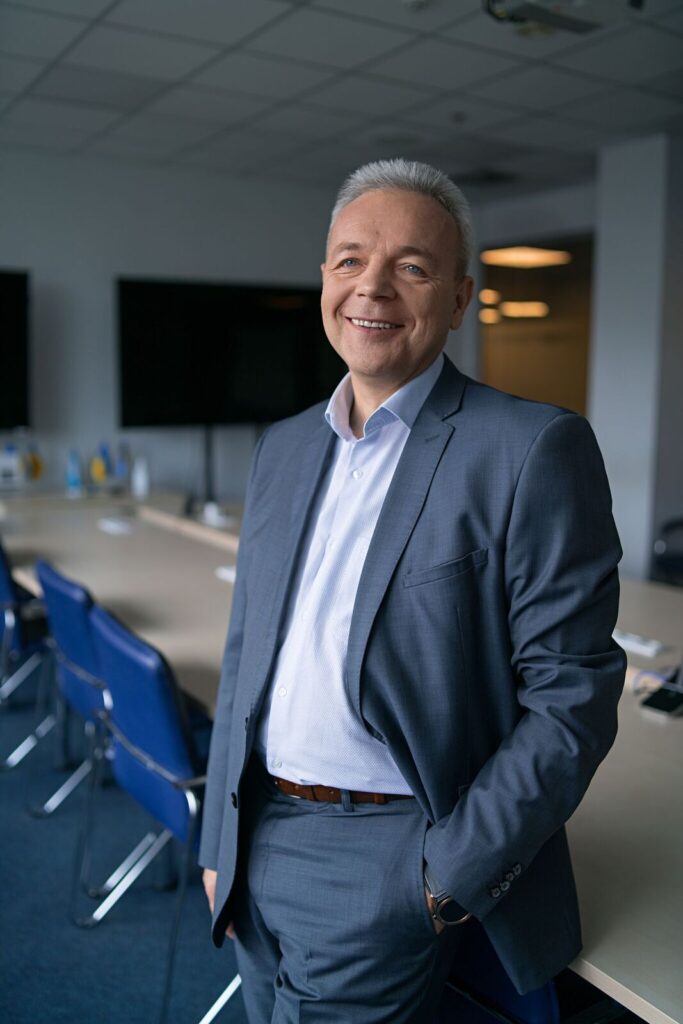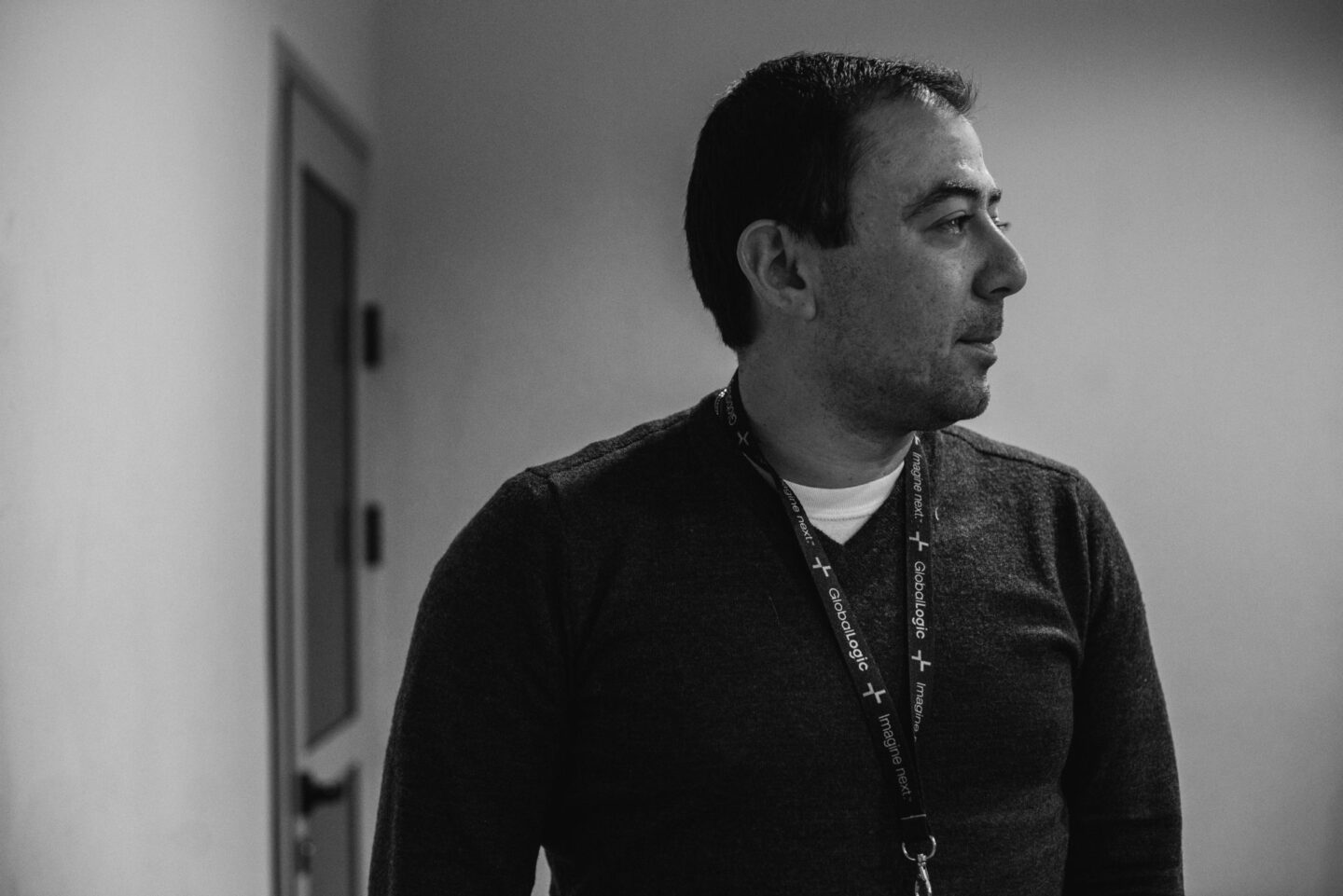“Technology of success” — a series of interviews with leaders of the most ambitious IT companies in the country. Throughout the year, together with Lviv IT Cluster, we will tell you about entrepreneurs and heads of tech companies in Ukraine, trying to better understand the people who are driving the country forward.
Yuriy Antoniuk, Director EPAM Ukraine — about starting the career in IT, creative economy and human capital as a foundation for Ukraine’s tech success.
Preparing for our conversation, I talked to a few friends who work in the IT industry. One of them said that you’re one of the main visionaries in the Ukrainian tech. Why do you think other people say that? How would you define your role?
It’s hard to comment on this, as I don’t know who said that, and what was the idea behind those words. Honestly, I don’t like big words. A visionary, not a visionary… For example, is Elon Musk a visionary or not? To answer this question correctly, you need a context.
The thing I definitely agree with — I do care about development of our country. I was raised here, my parents were raised here, it’s my homeland. I’ve been living and working abroad for more than 20 years — from California to Switzerland and Belarus. I moved back to Ukraine about 12 years ago.
I have always tried to understand how to make IT not only an “inside thing”. Because the Ukrainian IT sector is relatively small. Yes, it is 150-200 thousand professionals. These are cool and progressive people. But on a scale of 40 million people, that’s only a very small part.
It is important to understand what is the strength of the industry for a certain country. IT is interesting mainly for people who work in the industry. This has to do with the economic component and the opportunity to work on global projects.
And how IT can affect the entire country, not just a certain part of society? How do information technologies affect society, education, medicine, and everything else Ukraine is made up of?
If you want to live in a successful country, you need to be a visionary. We have to understand in which direction we should move
If you think about business and people you work with not only in the context of this business but also in the context of a large society and country, then, of course, there is a certain vision of development. If you want to live in a successful country, you need to be a visionary. We have to understand in which direction we should move and how we can use achievements of the IT industry to a broader group, our society. I’m confident that more and more people are starting to understand this. These visions penetrate into society and government.
In my opinion, modern Ukraine lacks a successful development model. But what makes a successful development model for a state? It’s a successful model for the development of its people.
The IT industry and the new creative economy in total are building this successful model. Young people see how they can build a career in Ukraine in the same way one can do it abroad, in any “normal” country. What I mean by this, is the fact that not everything is okay here at the moment. We all understand Ukraine still has lots of problems that need to be solved in different fields such as economy, culture, politics, tolerance, and attitude towards other people.
It’s often said that the IT industry is a social elevator.
Absolutely! That’s the right word. Yes, IT — is a social elevator, it’s a career for the young ones.
The second important thing here is the fact that the IT industry creates a large number of jobs. Of course, when a country is at war, everything else becomes a second priority. But at times of a stable economic situation, the state’s main role is helping to create workplaces. Business has to do it, but what we need is at least basic conditions provided by the state.
The number of jobs created is one of the most important indicators of economic development in the USA. They don’t focus on information about how much taxes or customs duties have been collected. All of this is good, but it won’t make people want to stay in this country.
You might have collected an extra few billion of taxes, but it won’t influence how a child or their parents make decisions about which school to choose. At the same time, we already know that there are more than 60 thousand Ukrainian students studying at universities in Poland.
So, what are we doing? Every year, we spend one and a half billion dollars on education — it’s quite a lot of money for Ukraine. And then it turns out that these people go to another country to study and work. The state does not think about how to create conditions for people to stay here.
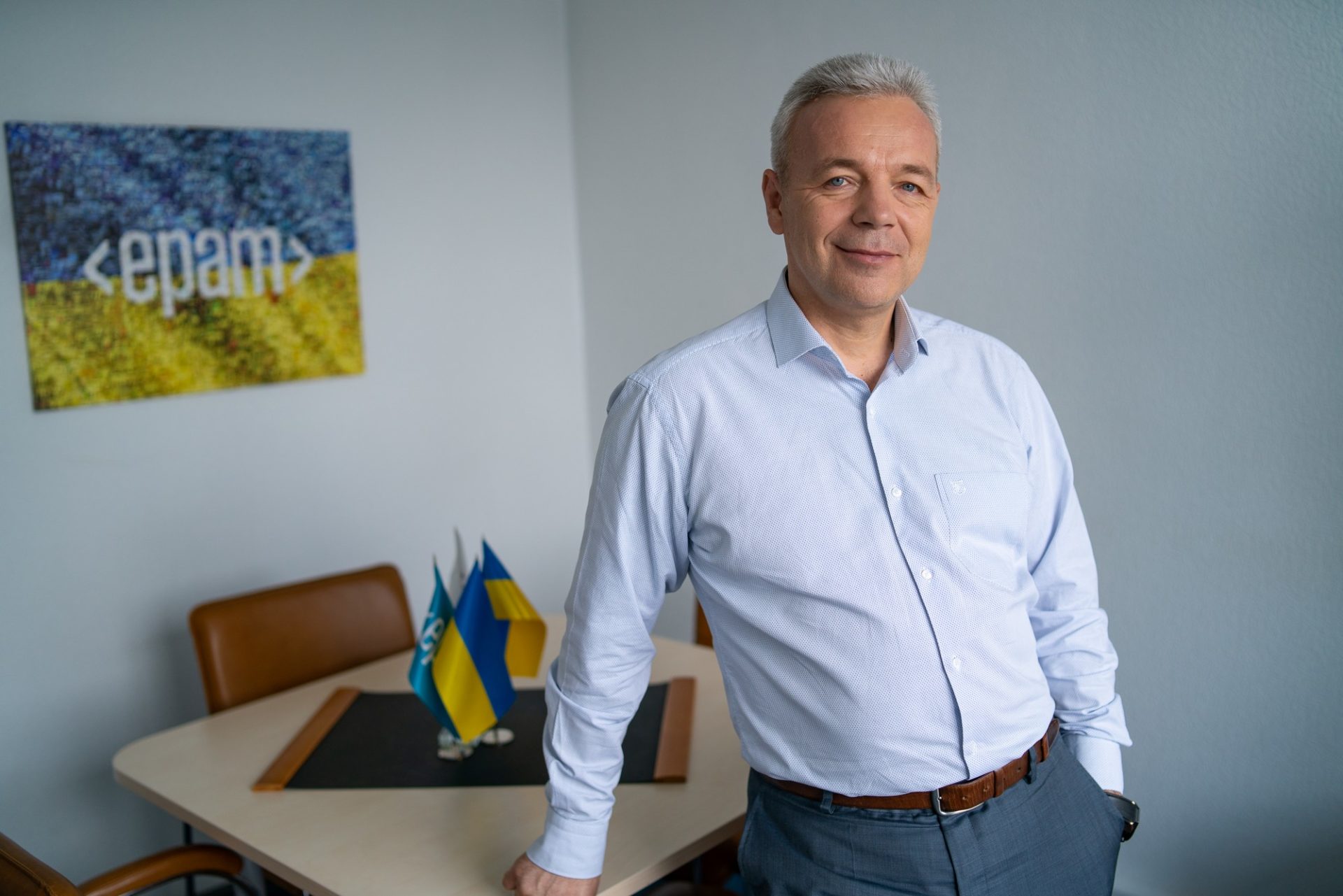
On the one hand, 150 thousand people working in the IT industry is not that much. However, as I see it — 150 thousand IT employees create additional 2-3 workplaces, which makes 300-500 thousand people in total. In addition, there are other creative industries — together we can get even more than half a million people.
If we have three-four million creative professionals, the country will definitely change. There will be many people who think in exactly the same way as you. It will be like an avalanche.
Processes with an avalanche effect bring dramatic changes in any society. That is how the Maidan appeared. And the same thing can happen with the new economy or new people. One of the problems the Ukrainian tech industry is facing, is the fact that we don’t develop the domestic market enough. There’re more than 2000 engineers working at our office in Kyiv, and about 6000 in Ukraine. However, all of them are working with foreign clients.
Sometimes we take Ukrainian projects pro bono, for example, for medical or education reforms. However, our companies don’t have a big domestic market. Ukrainians need to understand that the IT business can have an impact on them too.
If we have three-four million creative professionals, the country will definitely change. There will be many people who think in exactly the same way as you. It will be like an avalanche
These three factors — skilled jobs, development of the creative industry, and the domestic market — make up a vision for the IT industry. I am confident that people who work in this business need to form a vision what steps we need to take in order to make our country successful. If the country is successful, the business is successful too.
Let’s go a few steps back. It’s always interesting to learn a personal history. How did everything start for you? How and why did you end up in the IT industry?
I was born in Vinnytsia region. My village almost bordered with Moldova. Back at school, thinking about my future work and career, I wanted to become a researcher, a physicist. I won regional competitions in maths and physics a few times. It was clear I’m going to choose physics.
It was the time when the USSR attacked Afghanistan. They used to brainwash society, and most of my classmates decided to go to a military school. I was just looking for a college where I could do research. I found a college of air defense in Minsk, they had lasers, and I ended up studying quantum physics. That’s how I got into the army, and learned about computers for the first time. These were the 1980s.
It felt like something I liked. I could work on scientific problems, do it faster, and in a more interesting and useful way. At first, I learned to work on “big” machines, and then there were personal computers… Then I enrolled in a graduate school, wrote a PhD thesis, but didn’t defend it.
At the beginning of the 90s, everything was changing, and science wasn’t popular nor respected. It was quite a difficult time, and I realized I should take up commercial projects. That’s how I began to work exclusively with IT projects. At first, I worked at a few small companies, and then joined EPAM. It was one of a few companies that focused on a global market back then.
At that time IT was something like accounting services, etc. Before EPAM I worked on developing algorithms for gambling and lotteries at another company. In general, it was interesting: I liked maths, statistics, numbers, complex algorithms…
At EPAM I saw something different. At the beginning of the 2000s, we’ve been developing online portals for buying such complex goods as, for example, a car. Already then, you could choose a car online, change an engine, color, etc. This feels like an everyday thing today, but at that time it was absolutely fascinating.
Shortly after, the economic crisis began. Everything collapsed, but the company managed to overcome it. We started to focus on the most promising areas. One of them was the business environment in California. Basically, for 6 years I’ve been developing EPAM’s business connected with the Silicon Valley. At that time, we worked, for instance, with Oracle.
It was an awesome experience. Silicon Valley, local universities, San Francisco, even the nature around made me look on life in a different way. It was very interesting to see how everything works there.
In 2006-2007 we started to develop the Ukrainian office of the company. I was offered to move back from Belarus, as we needed someone familiar with local market and culture. We started with 50 employees in Kyiv, but already in 2007 we opened an office in Kharkiv, and then departments in Lviv, Vinnytsia, and Dnipro. In five years we became basically the biggest company in the country.

I lived abroad, including Belarus, but I think that Ukrainian culture is different. There is one trait that makes Ukrainians different from others — it’s a desire to achieve things. Not all nations are that focused, persistent, and stubborn. My international colleagues have noticed it too. This is the reason why I’m staying here.
But there are some traits we as a nation still need to develop. If we want to be a developed country, we need to be tolerant towards others and treat difference in a positive way.
At the last Book Arsenal, I took part in the presentation of Richard Florida’s book “The Rise of the Creative Class”. According to him, there are three values of the creative class — besides technologies and talent, it’s tolerance. Yes, talent and technologies are important, but it’s going to be difficult without tolerance.
How was the company developing in Ukraine? Could you outline a few key stages?
There were a few key stages. The first one — inflation. It’s like a big bang, at first, everything rapidly expands to a certain extent that you can operate.
It was a period when we were building offices. Afterwards, we started to focus and think what makes us different from other companies, and what can we offer to our clients. At that time, we decided that we will try to create awesome product IT solutions for the financial industry.
In the mid-2000s, before the economic crisis, the financial sector was a very promising area for IT professionals. New tech developments appeared. The industry was on the rise. In a way, people were making money out of money. There was a certain negative touch to it, but at the same time there were lots of breakthrough things.
Financiers used to hire a lot of programmers and mathematicians to understand, for example, how to organize automated bidding. Not many people know about it, but now many trades are automated, people don’t make any decisions. Programs are trading with one another. Right now, there are a few large investment companies where decisions are made by AI.
This period was important for the development of the Ukrainian IT because that’s when large banks came here and brought an understanding of how a world-class business works
But this period was important for the development of the Ukrainian IT because that’s when large banks came here and brought an understanding of how a world-class business works. Ukrainian programmers could work with businesses from all over the world, provide services for the clients of these big banks and learn more about business processes and approaches. We continue to work with large banks until this day.
This way the first stage. We can call it globally-technological in the financial sphere.
Afterwards, we realized that the world has changed in the last 10 years. We’re living in the era of digital transformation. It’s the second big stage. Business has realized that it needs new channels to access clients who want to be online. Then, IT professionals who used to sit in the closed premises of banks got out to the world. From the back office, where they helped accountants calculate a company’s performance or assisted in planning and production processes, they came to the front. Because nowadays, success depends on how cool your app works on a smartphone and how attractive and user-friendly it is for a young person.
Digital transformation means that IT is becoming the driving force behind your business. You not only need to have programmers but also business analysts, architects, marketers, people who understand UX and who can handle business challenges. At first, it was difficult, because there were almost no such people, and all of us had to learn a lot. But it was a big boost for the Ukrainian IT.
Now, in my opinion, a new stage began with big data. And that’s very cool since all companies are collecting huge amounts of data. All our mobile operators, for example, have millions of gigabytes of data on who and from where we are calling, cartographic companies have their own data, Facebook — its own. In total, there are over 25,000 programmers working for EPAM, so we also have data about them.
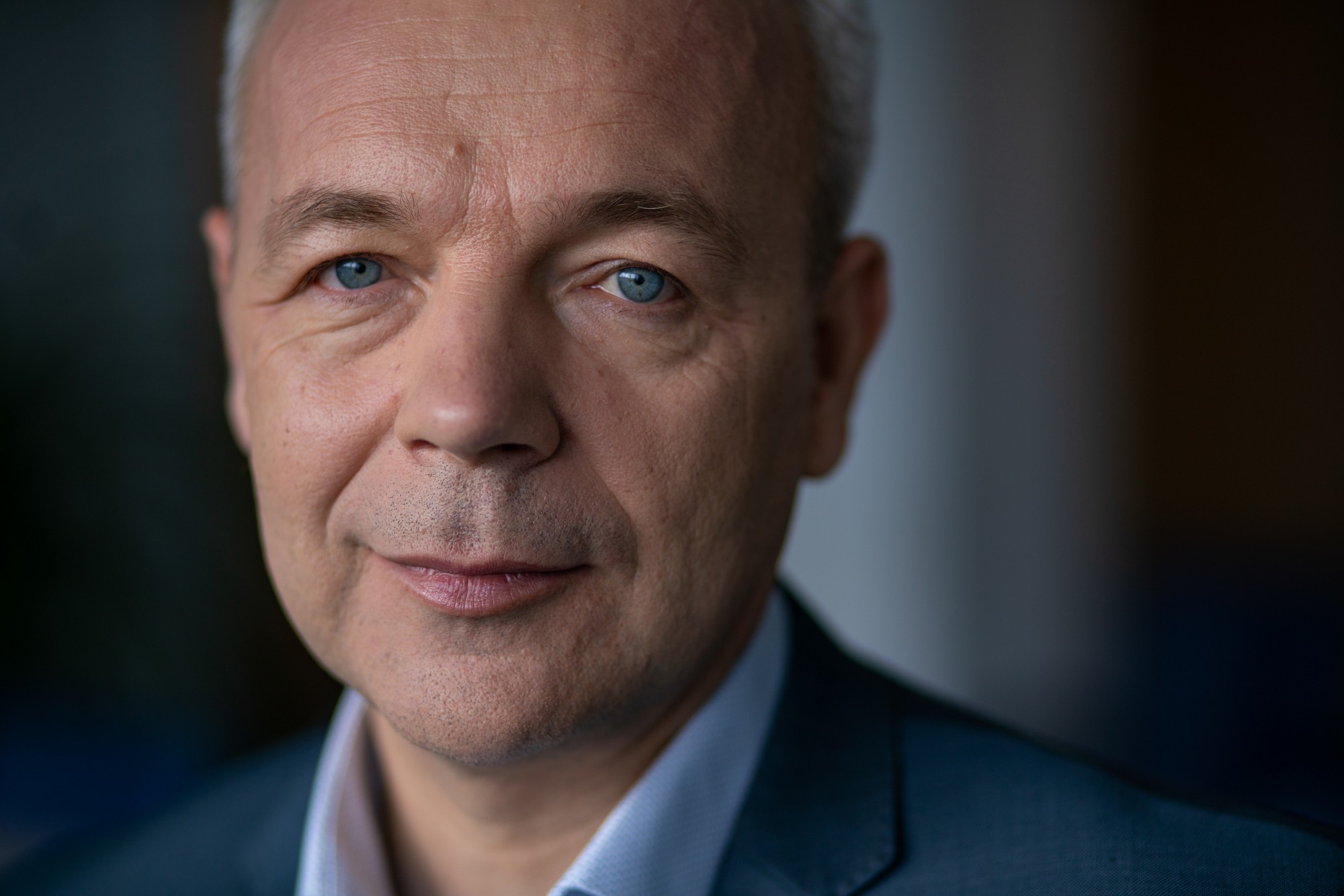
We also work with Chevron. Every day they receive 1-2 terabytes of data from every tower. A part of data is disposed, but if you take into account that they have thousands of towers and all these data on wind and pressure can be processed, you can imagine that it’s a potential “gold mine”. AI processes these data, as it’s way too much information for a human.
Within EPAM we have departments that are working on unmanned taxis together with some large corporations. Unfortunately, I can’t disclose any details. It’s gonna be the basis of the third wave, which is very cool.
I believe that AI and things connected to it will bring similar changes as smartphones and telecom did back when everyone went online. AI will change everything.
Elon Musk and late Stephen Hawking opposed this idea. I partially agree with them, because every time you do something positive, a negative context appears. In my opinion, the loss of privacy is the most negative thing in this story. The choice is easy: you either want to use all the possibilities of AI, and understand that a lot of information about you will be known, or you must abandon smartphones and other advances of the tech industry completely.
How to set a boundary correctly? Who should do it?
There are certain things that are now being regulated, for example, with GDPR.
For journalists, it’s a special story.
The things we are now talking about are not the future, it’s already happening now, in the present. AI and big data are penetrating into our lives. States and people are trying to set boundaries with things like GDPR.
In the USA, this issue is treated in a more relaxed way. I’ve already heard from various companies that GDPR creates problems. Take, for example, street photos — you need to request permission even if a person got photographed accidentally.
Whether we like it or not, we have to give up a certain amount of our privacy. People have to decide how private their lives should be, while regulations on a state level shouldn’t be so strict.
Please, tell us about the most interesting and challenging projects of the company.
One of such cases — the development of a digital platform for Canadian Tire, a huge Canadian retailer. It was a new experience for us. When you see that together with another company you can create a space for clients where they can go to a store, choose a product in a 3D format on a big screen, order, pay online, and get it delivered home in an hour… It’s just a different attitude to the whole shopping process when at first we look through products available online, and then go to a brick-and-mortar store to see if the product is actually available.
That’s another context. It requires other possibilities because you must understand not only the IT components of the process but also why a person makes a purchase. In retail, they are now very carefully studying how our brain works, what is dopamine and how to encourage us to buy things.
It is a combination of a brain, reality, visualization, and your technical solution.
Another case — our partnership with Google Cloud. We are developing advanced solutions for their cloud platforms. It’s something we do in Ukraine, and it’s one of the promising directions because it combines cloud, machine learning, big data, etc. Unfortunately, we still don’t have many projects with quantum computers, but I’m confident that in five years things will change.
These are two cool examples of how Ukrainian companies and talents are working on the cutting edge of technology.
Please tell us about EPAM in the context of human capital. How many people work at the company? Who are they?
We’re constantly growing. At the moment, we’re working together with 6000 engineers and programmers, who develop IT solutions, and a few hundred experts that are responsible for the company’s operation. We’re the biggest IT company in Ukraine.
These are young and creative people with rather unconventional approaches to work. Human capital is the most important thing for us, as everything we do is thanks to the people and for the people.
The success of the Ukrainian IT industry is based on our education. If we didn’t have many skilled professionals, good universities, the state of things would be completely different. Ukrainian universities might not be in global top lists, but we should not underestimate the impact Ukrainian education has on the IT industry here. We’re actively cooperating with all big universities in Ukraine, educating and supporting the talented youth.
We start working with students from the early freshmen years, which means that for many of them EPAM becomes the first employer. All employees working at the company can continue learning and deepening their expertise with the help of corporate resources. We promote continuous learning since it’s the requirement of the time.
Human capital is the foundation of the entire industry. And not only IT, but also the creative industry in general.
Let’s talk about creativity. You’ve been extremely active in this area recently — you publish articles, take part in public discussions, etc… Why creativity?
Ukraine needs to be different. You cannot simply copy somebody’s experience and achieve the same results. Every country exists in specific circumstances. I’m confident that Ukrainians have the traits that prompt creating something new. Our people have the talent and desire. We only need to create a demand for it.
Our programmers sometimes have a hard time because of this. They say in other countries people just do their job, while Ukrainians like to question things, offer personal solutions or alternatives.
The world is constantly developing, and soon routine jobs won’t exist anymore. Whether we want it or not, simple jobs will gradually disappear. Over time robots will become a cheaper and more convenient alternative to humans (no salaries, vacation, less worry).
Computers, AI, robots can do a lot. However, what makes a human really valuable, is the ability to apply creativity. So, let’s start doing it now, and not wait another 5-10 years when it’s going to be inevitable.
It’s important to understand that it’s not just a Ukrainian problem, but a global one. There are countries that perfectly understand this and actively develop the creative industry sector. Ukraine is currently solving the problems of integrity and reforms, therefore, the business should take responsibility and develop the creative potential of the country. Because with our 3% GDP growth, and constant inflation we won’t go far. At the same time, when we start to do creative things, we can quickly rise as there will be a demand on the global market.
What is the corporate culture of the company? And how do you develop and promote the creativity of your employees?
We don’t try to promote it, but rather try to keep the startup spirit on the same level as when we just started the business in Ukraine. We want this spirit not to get dissolved in a large corporate environment with rules and regulations. It is important for a person to remain free and have a desire to create something new.
We help people get new knowledge: certifications, conferences, training programs, etc. We do our best to promote career development.
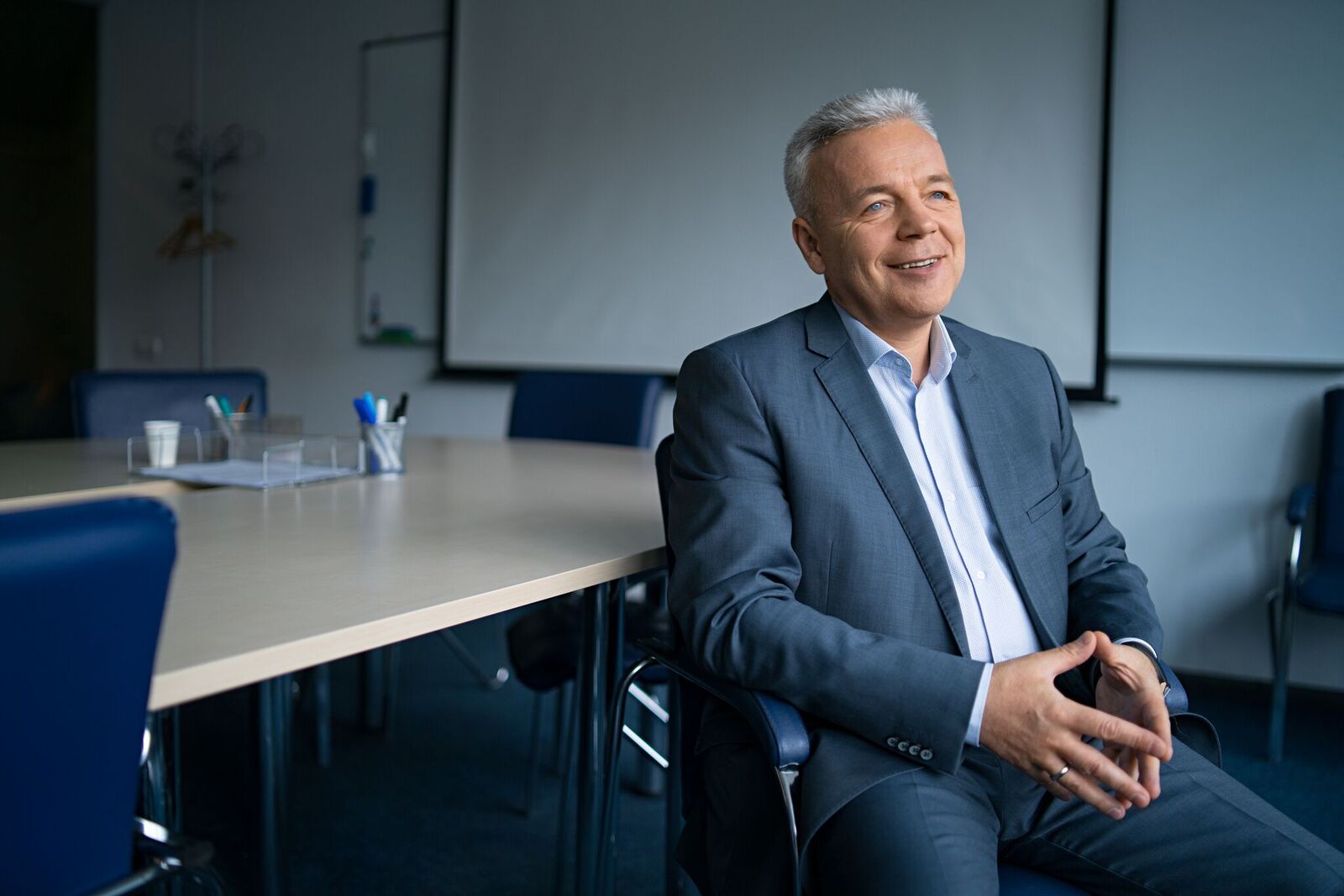
We support creative ideas and initiatives of our employees, because, first of all, we need it too. If we become a company that simply distributes tasks and employs 9 to 18, we won’t succeed.
Some people think that programmers only code, which doesn’t sound very creative. However, that’s not the case, at first they make up the code in their head, then visualize it, and create a product or model. That’s creativity. Moreover, we have a lot of creative consultants, mathematicians, or chemists working with us.
You started your career at a different time. What advice would you give to young programmers and IT entrepreneurs?
The first and the most important thing — choose something that you really like. We often choose work because it’s popular or well-paid. You should find something that makes you tick. Such people are happy and successful.
Secondly, if you want to build a business, be a leader, a manager, you need to be able to trust your team. If you are a leader, but you don’t create conditions where people can trust each other, the team won’t succeed, and neither will the manager. It’s not the commander who wins a battle. Any success is achieved by a team of people. If you want your employees to trust each other and have a desire to work, you need to provide conditions where self-realization is possible.
Of course, there are other methods: team control, clear tasks… Such managers also succeed, but you have to understand that this way you might win the battle, but lose the war. People won’t enjoy working in such conditions.
It is necessary to create such conditions where the team trusts you, and you trust the team. This way, you can develop and grow together.
